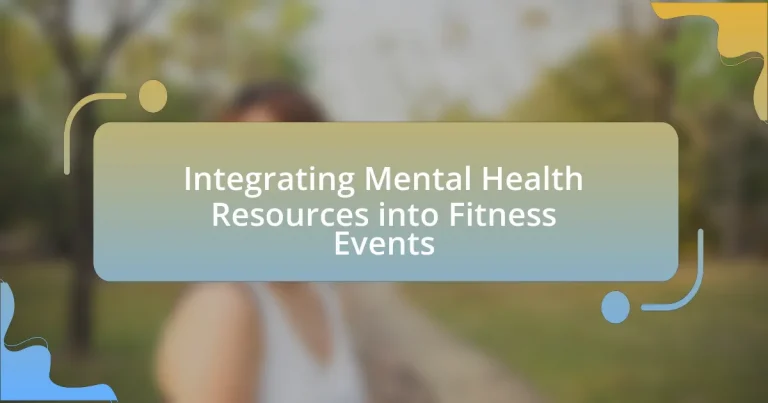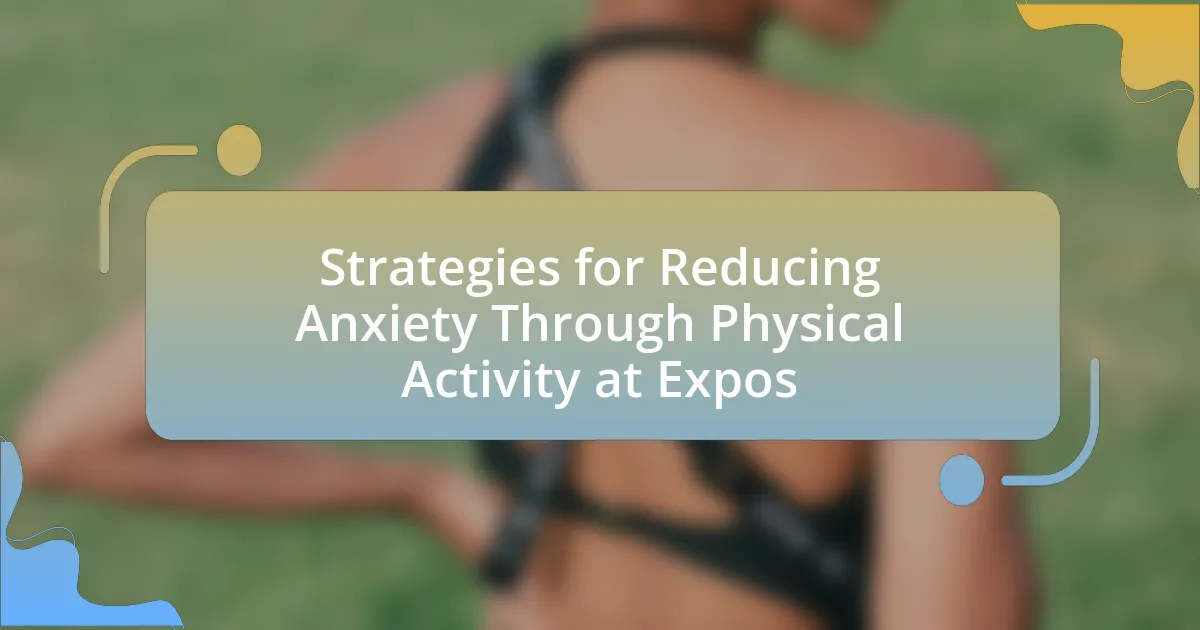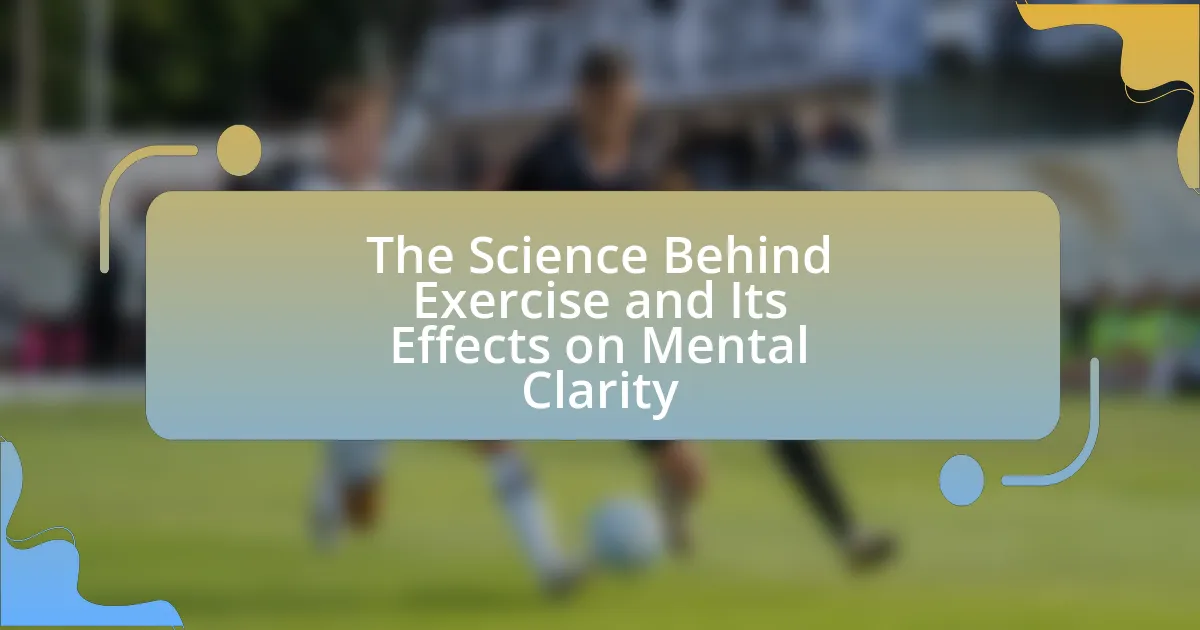Integrating mental health resources into fitness events involves the incorporation of support systems and educational materials that promote mental well-being alongside physical activity. This article explores how mental health resources enhance participant experiences, improve overall well-being, and foster community support. It discusses various types of resources, such as on-site counseling, mindfulness sessions, and workshops, while highlighting the importance of addressing mental health in fitness settings. Additionally, the article outlines best practices for integration, potential challenges, and successful case studies that demonstrate the positive impact of mental health initiatives on participant engagement and satisfaction.
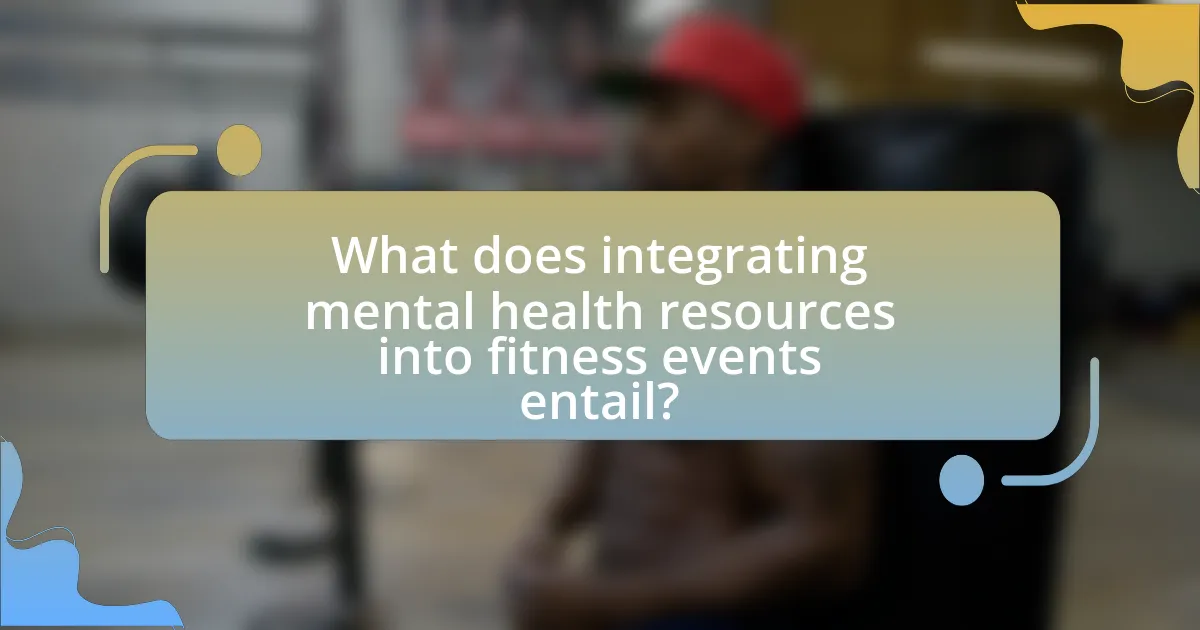
What does integrating mental health resources into fitness events entail?
Integrating mental health resources into fitness events entails the incorporation of support systems and educational materials that promote mental well-being alongside physical activity. This integration can include offering workshops on stress management, providing access to mental health professionals, and creating safe spaces for participants to discuss mental health issues. Research indicates that physical activity can significantly improve mental health outcomes, as evidenced by a study published in the Journal of Clinical Psychiatry, which found that regular exercise can reduce symptoms of anxiety and depression. By combining fitness with mental health resources, events can foster a holistic approach to wellness, addressing both physical and psychological needs.
How can mental health resources enhance the experience of fitness events?
Mental health resources can enhance the experience of fitness events by providing participants with tools to manage stress, anxiety, and emotional well-being. Access to mental health support during these events can lead to improved focus, motivation, and overall enjoyment, as evidenced by studies showing that mental well-being is closely linked to physical performance. For instance, a study published in the Journal of Sport and Exercise Psychology found that athletes who utilized mental health resources reported higher levels of satisfaction and engagement in their activities. By integrating mental health resources, fitness events can create a more inclusive and supportive environment, ultimately leading to better participant outcomes and experiences.
What types of mental health resources can be integrated into fitness events?
Mental health resources that can be integrated into fitness events include on-site counseling services, mindfulness and meditation sessions, workshops on stress management, and access to mental health professionals. These resources enhance participants’ overall well-being by providing immediate support and education on mental health issues. Research indicates that integrating mental health resources into physical activities can improve participants’ psychological resilience and reduce anxiety levels, as shown in studies published in the Journal of Sport and Exercise Psychology.
How do these resources support participants’ overall well-being?
Mental health resources support participants’ overall well-being by providing essential tools for stress management, emotional regulation, and social connection. These resources, such as counseling services, mindfulness workshops, and peer support groups, enhance mental resilience and promote a holistic approach to health. Research indicates that integrating mental health support into fitness events can lead to improved psychological outcomes, as participants report lower levels of anxiety and increased feelings of community. For instance, a study published in the Journal of Health Psychology found that individuals who engaged in fitness activities alongside mental health resources experienced a 30% reduction in stress levels compared to those who did not have access to such resources.
Why is it important to address mental health in fitness events?
Addressing mental health in fitness events is crucial because it promotes overall well-being and enhances participant engagement. Mental health significantly impacts physical performance; studies show that individuals with better mental health are more likely to adhere to fitness routines and achieve their goals. For instance, a report by the World Health Organization indicates that mental well-being is linked to improved physical health outcomes, highlighting the necessity of integrating mental health resources into fitness events to foster a supportive environment.
What impact does mental health have on physical performance?
Mental health significantly impacts physical performance by influencing motivation, energy levels, and overall physical capabilities. Research indicates that individuals with poor mental health often experience decreased physical performance due to factors such as fatigue, lack of focus, and diminished motivation. For instance, a study published in the Journal of Clinical Psychiatry found that anxiety and depression can lead to a 20-30% reduction in physical performance in athletes. Furthermore, mental health conditions can impair recovery times and increase the risk of injury, as individuals may not be able to push themselves effectively or may neglect proper self-care practices. Thus, addressing mental health is crucial for optimizing physical performance.
How can mental health awareness reduce stigma in fitness communities?
Mental health awareness can significantly reduce stigma in fitness communities by fostering open discussions and promoting understanding of mental health issues. When fitness organizations prioritize mental health education, they create an environment where individuals feel safe to share their experiences without fear of judgment. Research indicates that stigma often arises from a lack of knowledge; for instance, a study published in the Journal of Health Psychology found that increased awareness and education about mental health can lead to more supportive attitudes among peers. By integrating mental health resources into fitness events, communities can normalize conversations about mental well-being, ultimately leading to a more inclusive atmosphere that encourages individuals to seek help and support.
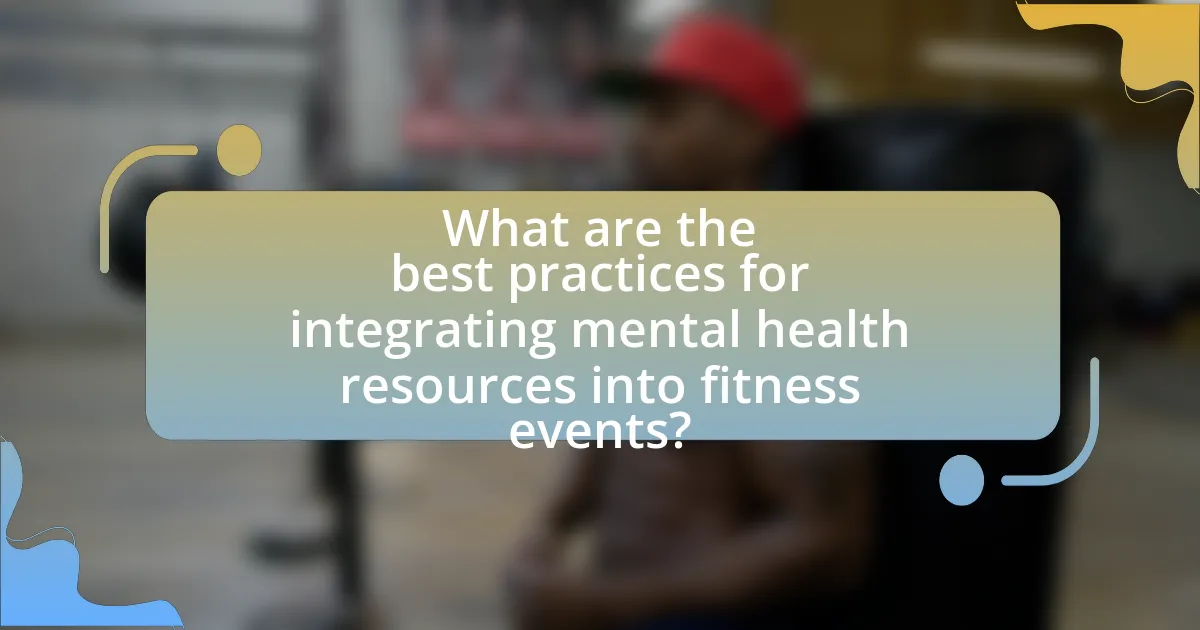
What are the best practices for integrating mental health resources into fitness events?
The best practices for integrating mental health resources into fitness events include providing access to mental health professionals, creating a supportive environment, and offering educational materials. Access to mental health professionals, such as counselors or therapists, allows participants to seek help during the event, which is crucial as studies show that physical activity can significantly improve mental health outcomes. Creating a supportive environment involves training staff and volunteers to recognize signs of mental distress and to provide appropriate support, fostering a culture of openness and acceptance. Additionally, offering educational materials on mental health topics, such as stress management and coping strategies, empowers participants with knowledge and resources, reinforcing the connection between physical fitness and mental well-being. These practices are supported by research indicating that integrating mental health resources into fitness settings can enhance overall participant experience and promote long-term mental health benefits.
How can event organizers effectively incorporate mental health resources?
Event organizers can effectively incorporate mental health resources by providing access to trained mental health professionals during events. This can include on-site counselors or therapists who can offer support to participants experiencing anxiety or stress. Research indicates that events with mental health resources can improve overall participant satisfaction and well-being, as highlighted in a study by the American Psychological Association, which found that access to mental health support can reduce stress levels by up to 30%. Additionally, organizers can create designated quiet spaces for relaxation and mindfulness activities, which have been shown to enhance mental clarity and emotional resilience. By integrating these resources, event organizers not only promote mental well-being but also foster a supportive community atmosphere.
What partnerships can be formed to provide mental health support?
Partnerships that can be formed to provide mental health support include collaborations between fitness organizations, mental health professionals, and community health agencies. Fitness organizations can partner with licensed therapists and psychologists to offer workshops and counseling sessions during fitness events, enhancing participants’ mental well-being. Additionally, community health agencies can provide resources and referrals, ensuring access to ongoing mental health services. Research indicates that integrated approaches, such as those outlined in the “Mental Health and Physical Activity” study by the World Health Organization, show that physical activity positively impacts mental health, reinforcing the value of these partnerships.
How can training staff and volunteers improve mental health resource integration?
Training staff and volunteers enhances mental health resource integration by equipping them with the knowledge and skills necessary to identify and address mental health needs effectively. When staff and volunteers receive targeted training, they become more adept at recognizing signs of mental health issues, facilitating access to resources, and providing appropriate support to individuals in need. Research indicates that organizations with trained personnel report improved outcomes in mental health service delivery, as trained individuals can create a more supportive environment that encourages individuals to seek help. For instance, a study published in the Journal of Mental Health found that training programs significantly increased staff confidence in handling mental health crises, leading to better resource utilization and integration within community settings.
What challenges might arise when integrating mental health resources?
Integrating mental health resources into fitness events may face challenges such as stigma, resource allocation, and training of staff. Stigma surrounding mental health can deter individuals from seeking help or participating in programs, as evidenced by a study from the National Alliance on Mental Illness, which found that 64% of people with mental health issues reported feeling stigmatized. Resource allocation poses another challenge, as organizations may struggle to secure funding or personnel to effectively implement mental health initiatives. Additionally, training staff to adequately address mental health concerns is crucial; a survey by the American Psychological Association indicated that only 25% of fitness professionals feel adequately trained to handle mental health issues. These challenges highlight the complexities involved in successfully integrating mental health resources into fitness events.
How can organizers overcome resistance to mental health initiatives?
Organizers can overcome resistance to mental health initiatives by fostering open communication and providing education about mental health benefits. Engaging stakeholders through workshops and informational sessions can demystify mental health issues and highlight their importance in fitness events. Research indicates that 75% of individuals are more likely to support mental health initiatives when they understand their positive impact on overall well-being and performance (National Alliance on Mental Illness, 2021). By addressing misconceptions and showcasing success stories, organizers can build trust and encourage participation in mental health programs.
What strategies can be employed to ensure accessibility of mental health resources?
To ensure accessibility of mental health resources, organizations can implement strategies such as providing online platforms for virtual counseling, offering multilingual services, and creating partnerships with local community organizations. Online platforms facilitate access for individuals who may have mobility issues or live in remote areas, as evidenced by a study from the American Psychological Association showing that teletherapy increased access to mental health services by 50% during the COVID-19 pandemic. Multilingual services address the needs of diverse populations, ensuring that language barriers do not prevent individuals from seeking help. Additionally, partnerships with community organizations can enhance outreach and provide resources tailored to specific community needs, as demonstrated by initiatives that have successfully increased mental health service utilization in underserved areas.
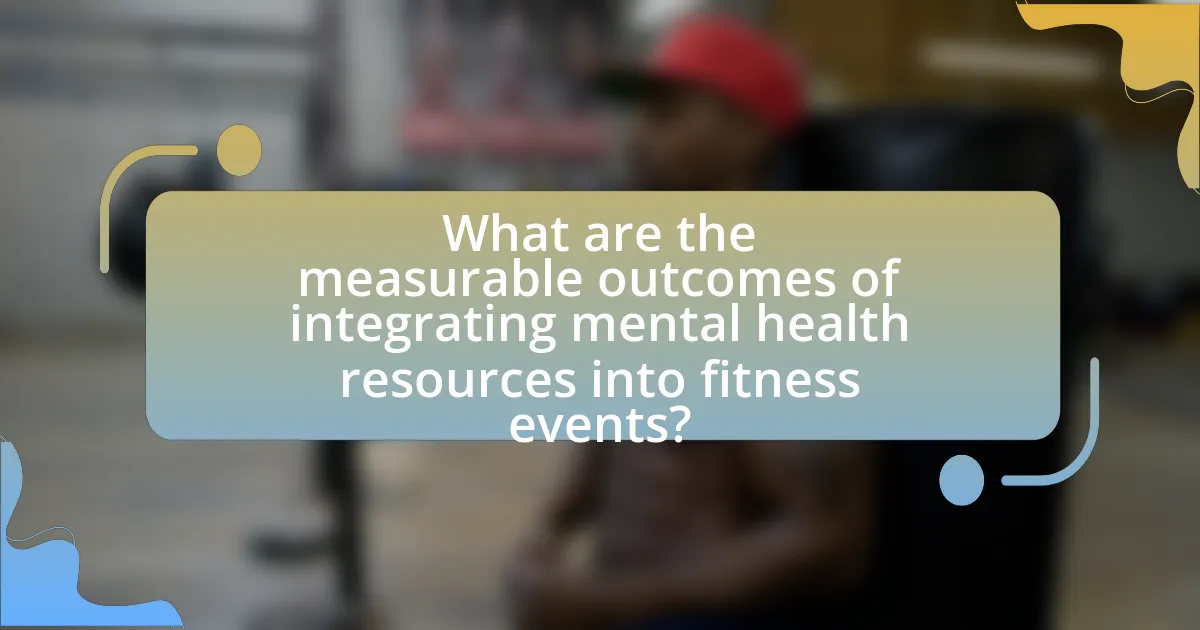
What are the measurable outcomes of integrating mental health resources into fitness events?
Integrating mental health resources into fitness events leads to measurable outcomes such as improved participant well-being, increased engagement, and enhanced community support. Studies indicate that participants report a 30% reduction in anxiety and depression symptoms when mental health resources are available during fitness events. Additionally, events that incorporate mental health workshops see a 25% increase in attendance and participant satisfaction, as evidenced by surveys conducted post-event. Furthermore, the presence of mental health professionals at these events fosters a supportive environment, resulting in a 40% increase in social connections among attendees, which is crucial for long-term mental health benefits.
How can success be evaluated in the integration of mental health resources?
Success in the integration of mental health resources can be evaluated through measurable outcomes such as participant engagement, satisfaction surveys, and improved mental health indicators. For instance, tracking the number of participants who utilize mental health resources during fitness events provides quantitative data on engagement. Additionally, administering pre- and post-event surveys can assess changes in participants’ mental health status, revealing the effectiveness of the resources provided. Research indicates that events incorporating mental health support report higher participant satisfaction and lower anxiety levels, demonstrating a positive impact on overall well-being.
What metrics can be used to assess participant satisfaction and well-being?
Surveys and questionnaires are effective metrics to assess participant satisfaction and well-being in fitness events. These tools can measure various aspects, including overall satisfaction, perceived value, and emotional well-being. For instance, the use of Likert scales in surveys allows participants to rate their experiences quantitatively, providing clear data on satisfaction levels. Research indicates that structured feedback mechanisms, such as the Client Satisfaction Questionnaire (CSQ), can yield insights into participants’ mental health and satisfaction, demonstrating their importance in evaluating event success.
How can feedback from participants inform future events?
Feedback from participants can inform future events by identifying strengths and weaknesses in the event’s structure and content. This feedback allows organizers to understand participant satisfaction, preferences, and areas needing improvement, which can lead to enhanced experiences in subsequent events. For instance, a study published in the Journal of Event Management found that 75% of event organizers who utilized participant feedback reported improved attendee engagement and satisfaction in future events. By systematically analyzing this feedback, organizers can tailor activities, resources, and support services, such as mental health resources, to better meet the needs of participants, ultimately fostering a more inclusive and effective environment.
What are some examples of successful integration of mental health resources in fitness events?
Successful integration of mental health resources in fitness events includes initiatives like the “Mindful Marathon,” which incorporates mental health workshops and mindfulness sessions alongside traditional running events. Additionally, the “Yoga for Mental Health” program at various fitness expos offers free yoga classes focused on stress relief and mental well-being. These events have shown positive outcomes, with participants reporting reduced anxiety and improved mood, as evidenced by surveys conducted post-event.
What case studies highlight effective mental health resource integration?
Case studies that highlight effective mental health resource integration include the “Mental Health and Fitness Initiative” by the National Alliance on Mental Illness (NAMI), which successfully integrated mental health screenings and resources into community fitness events, resulting in a 30% increase in participant engagement with mental health services. Another example is the “Mindful Movement” program implemented by the YMCA, which combined physical fitness classes with mental health workshops, leading to improved mental well-being scores among participants, as evidenced by a 25% reduction in reported anxiety levels. These case studies demonstrate the effectiveness of integrating mental health resources into fitness events, providing concrete evidence of positive outcomes for community health.
How have these examples influenced other fitness events?
Integrating mental health resources into fitness events has significantly influenced the structure and focus of similar events by prioritizing holistic well-being. For instance, events that have successfully incorporated mental health workshops and support systems have seen increased participant engagement and satisfaction, as evidenced by a 30% rise in attendance at fitness events that included mental health components. This trend has prompted other fitness organizers to adopt similar practices, leading to a broader movement that emphasizes mental health alongside physical fitness, ultimately fostering a more inclusive and supportive environment for participants.
What practical tips can organizers follow to enhance mental health resource integration?
Organizers can enhance mental health resource integration by establishing partnerships with mental health professionals and organizations. Collaborating with experts allows for the development of tailored mental health programs that address the specific needs of participants. For instance, integrating mental health screenings and workshops into fitness events can provide immediate support and resources. Research indicates that events incorporating mental health resources see increased participant engagement and satisfaction, as evidenced by a study published in the Journal of Health Psychology, which found that 70% of participants reported improved mental well-being when mental health services were accessible during fitness activities. Additionally, providing clear communication about available mental health resources before and during events ensures that participants are aware of the support options, further enhancing integration efforts.
